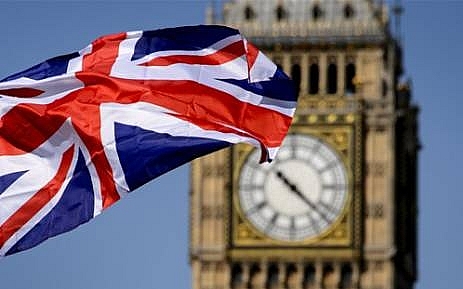UK seeks bilateral FTA with Vietnam in light of Brexit
 |
| UK seeks bilateral FTA with Vietnam in light of Brexit, source AFP |
Tran Ngoc An, Vietnam’s Ambassador to the UK, told VIR that the UK will officially leave the EU on March 29, 2019, which has prompted the country to strengthen its trade and investment ties with its partners. “Vietnam is viewed by British investors as one of the most attractive destinations for business in the Asia-Pacific region,” An said. “[Due to Brexit], the UK side has been proactively working with the Vietnamese side on boosting new bilateral co-operation mechanisms, including a potential free trade agreement (FTA).”
An FTA refers to a free trade area where commerce in goods and services can be conducted across their common borders, without tariffs or hindrances.
“I believe that if the FTA comes, a new wave of UK investments will hit Vietnam, and Vietnam-UK trade turnover will strongly increase,” An said.
Economist Oliver Reynolds from Spain-based FocusEconomics, which provides in-depth economic analysis globally, also told VIR that after Brexit, the UK will look to continue to nurture its blossoming relationship with Vietnam, and “is almost certain to use the agreement signed between the EU and Vietnam as the basis for a bilateral trade deal, whether or not the EU agreement comes into force before the departure date”.
“In its current form, the deal would eliminate over 99 per cent of the tariffs between the two countries, and hack away at non-tariff barriers, such as regulations, intellectual property rights, and sustainable development,” Reynolds said.
According to the British Business Group Vietnam (BBGV), Vietnam is a great magnet for UK investors. During the fiscal year of 2017-2018, there was rising interest in doing business in Vietnam among UK companies.
“The Business Centre received a total of 339 enquiries, from which we commissioned 40 services to arrange meetings for UK companies to meet Vietnamese partners and deliver their services/products in Vietnam,” BBGV said in a bulletin released two weeks ago.
“Compared to the fiscal year of 2016-2017, the number of enquiries and services commissioned rose by 183 and 235 per cent, respectively. The number of export opportunities to Vietnam increased from 48 to 163. The number of responses to these opportunities from the UK rose from 71 to 615, eight times higher than last year,” the bulletin said.
As part of the intensifying relationships, VinaCapital recently took a delegation of Vietnamese companies to the UK to seek partners.
“The UK’s big companies that I have met with highly value the Vietnamese market, which they said has great potential in growth in the medium and long terms,” An stressed. “They are particularly interested in investing in the sectors of services, finance, insurance, IT, and high-tech consultancy.”
Vietnam-UK bilateral trade expanded to $6.1 billion last year, with Vietnam exporting $5.4 billion and importing $700 million worth of goods, resulting in a huge trade surplus with the UK. In this year’s first five months, the bilateral trade turnover grew by 40 per cent, according to An.
As of August 20, the UK had 341 valid investment projects registered at $3.57 billion in Vietnam. Currently, many large UK companies, such as BP, BHP Billiton, Vodafone, P&O, Pilkington, Vietnam Gas Conversion System, GlaxoSmithKline, HSBC, and Standard Chartered, are operating in Vietnam with much success.
Two weeks ago, Foreign and Commonwealth Office Minister for Asia and the Pacific Mark Field said that the UK is exploring opportunities to raise its engagement with the ASEAN, including Vietnam, when it exits the EU, and is planning to step up partnerships for mutual benefit in areas such as education, innovation, smart cities, and cyber technology.
“In Vietnam, we are increasing our work to support sustained and inclusive economic growth. Over the next three years, programmes on low carbon energy, infrastructure development, healthcare reform, and trade will be rolled out,” Field said. “We are also working closely with the Vietnamese government on economic reform and governance practices, and trying to find better ways to mobilise funding for public investment.”
What the stars mean:
★ Poor ★ ★ Promising ★★★ Good ★★★★ Very good ★★★★★ Exceptional
Related Contents
Latest News
More News
- Vietnamese businesses diversify amid global trade shifts (February 03, 2026 | 17:18)
- Consumer finance sector posts sharp profit growth (February 03, 2026 | 13:05)
- Vietnam and US to launch sixth trade negotiation round (January 30, 2026 | 15:19)
- NAB Innovation Centre underscores Vietnam’s appeal for tech investment (January 30, 2026 | 11:16)
- Vietnam moves towards market-based fuel management with E10 rollout (January 30, 2026 | 11:10)
- Vietnam startup funding enters a period of capital reset (January 30, 2026 | 11:06)
- Vietnam strengthens public debt management with World Bank and IMF (January 30, 2026 | 11:00)
- PM inspects APEC 2027 project progress in An Giang province (January 29, 2026 | 09:00)
- Vietnam among the world’s top 15 trading nations (January 28, 2026 | 17:12)
- Vietnam accelerates preparations for arbitration centre linked to new financial hub (January 28, 2026 | 17:09)

 Tag:
Tag:




















 Mobile Version
Mobile Version